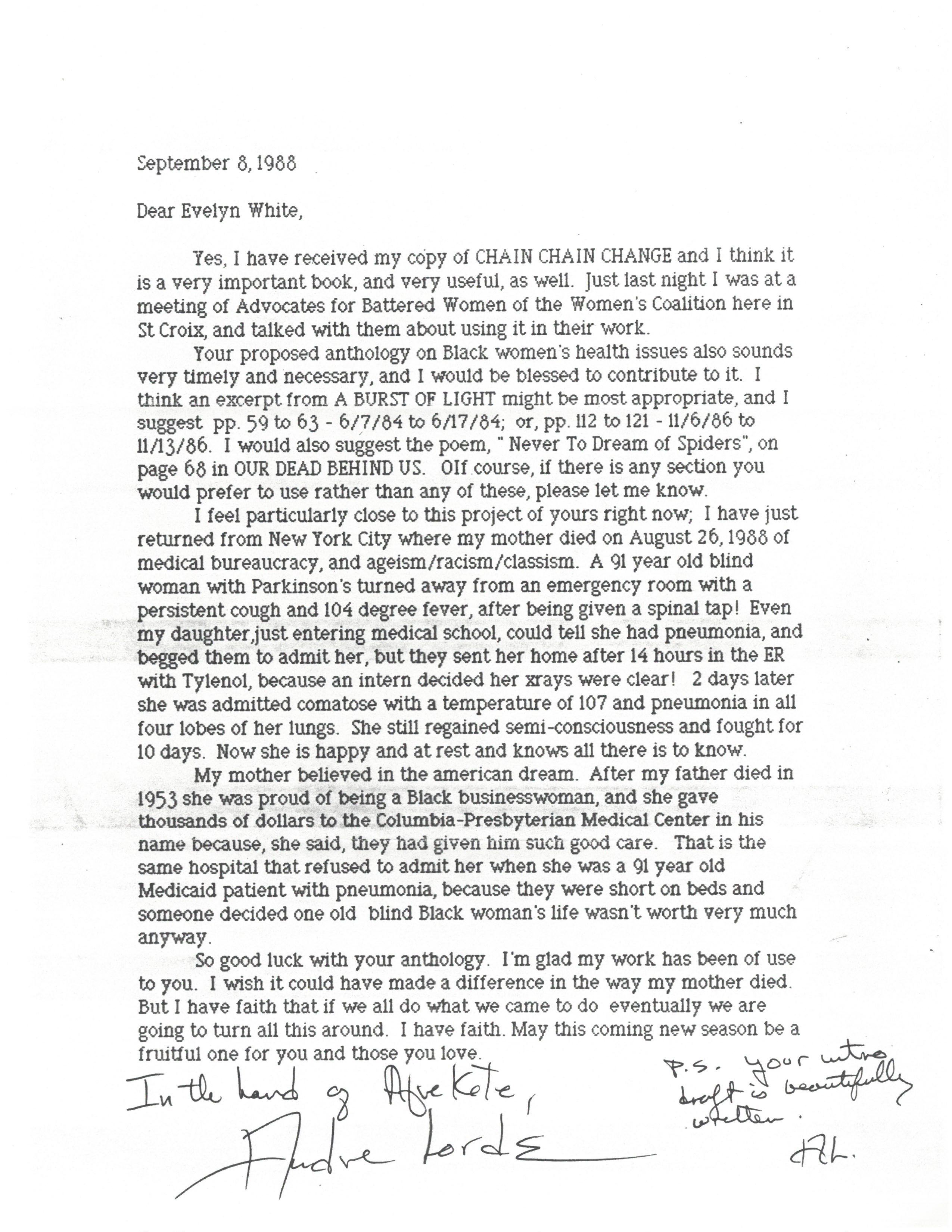|
|
Transcription: September 8, 1988 Dear Evelyn White, Yes, I have received my copy of CHAIN CHAIN CHANGE[1] [sic] and I think it is a very important book, and very useful, as well.[2] Just last night I was at a meeting of Advocates for Battered Women of the Women’s Coalition[3] here in St Croix,[4] and talked with them about using it in their work. Your proposed anthology on Black women’s health issues also sounds very timesly and necessary, and I would be blessed to contribute to it. I think an excerpt from A BURST OF LIGHT [sic] might be most appropriate, and I suggest pp. 59 to 63 – 6/7/84 to 6/17/84; or, pp. 112-121 – 11/6/86 to 11/13/86.[5] I would also suggest the poem, “Never To Dream of Spiders,” on page 68 in OUR DEAD BEHIND US [sic].[6] OIf [sic] course, if there is any section you would prefer to use rather than any of these, please let me know. I feel particularly close to this project of yours right now; I have just returned from New York City where my mother[7] died on August 26, 1988 of medical bureaucracy, and ageism/racism/classism. A 91 year old blind woman with Parkinson’s turned away from an emergency room with a persistent cough and 104 degree fever, after being given a spinal tap! Even my daughter,[8] just entering medical school, could tell she had pneumonia, and begged them to admit her, but they sent her home after 14 hours in the ER with Tylenol, because an intern decided her xrays were clear! 2 days later she was admitted comatose with a temperature of 107 and pneumonia in all four lobes of her lungs. She still regained semi-consciousness and fought for 10 days. Now she is happy and at rest and knows all there is to know. My mother believed in the american dream. After my father[9] died in 1953 she was proud of being a Black businesswoman, and she gave thousands of dollars to the Columbia-Presbyterian Medical Center in his name because, she said, they had given him such good care. That is the same hospital that refused to admit her when she was a 91 year old Medicaid patient with pneumonia, because they were short on beds and someone decided one old blind Black woman’s life wasn’t worth very much anyway. So good luck with your anthology. I’m glad my work has been of use to you. I wish it could have made a difference in the way my mother died. But I have faith that if we all do what we came to do eventually we are going to turn all this around. I have faith. May this coming new season be a fruitful one for you and those you love. [Handwritten: In the hand of Afrekete,[10] Audre Lorde
Transcribed by Natalia Shevin |
[1] “The book’s title is a variation of the soulful “chain chain chain” refrain from Aretha Franklin’s hit song “Chain of Fools” and was chosen to convey the message that African American women can break the cycle of violence that exists in so many of our lives” (Evelyn C. White, “Chapter One, What is Domestic Violence?” File 29, Seal Press, Oberlin College Special Collections).
[2] The positive review of White’s non-fiction work, particularly from another acclaimed author, must have been important for White to hear, given that she was nervous about the reception. In a letter to Barbara Wilson, White wrote on 9 July 1985, “We all know that I’ve put my credibility on the line with this book” (Letter from Evelyn C. White to Barbara Wilson, 9 July 1985, Series II, Box 9, File 27, Seal Press, Oberlin College Special Collections).
[3] Audre Lorde was a founding member of the Women’s Coalition of St. Croix. In their history statement, they write, “In 1981, a symposium for women writers, including Audre Lorde, Adrienne Rich and Dr. Gloria Joseph, was held at the College of the Virgin Islands on St. Croix. This event had an inspirational effect on the women who attended. They participated in a discussion on the need for proactive solutions to the growing problem of violence against women in the Territory. A group of the attendees began meeting regularly as a result of that discussion, across kitchen tables at first. They agreed to begin with the basics: helping victims and survivors in crisis. One of the first steps was to conduct a workshop for volunteer advocates. This would give them the tools to offer support without judgment to rape victims at police stations and hospitals” (“About Us: WCSC’s History,” Women’s Coalition of St. Croix, web access, accessed 1 July 2016).
[4] Saint Croix, Virgin Islands, where Audre Lorde moved before her death in 1992.
[5] These passages are excerpts from Lorde’s essay, “A Burst Of Light: Living With Cancer” (Audre Lorde, A Burst of Light (Ithaca, New York: Firebrand Books, 1988).
[6] This poem alludes to death and acceptance. The last line is “a burst of light” (Audre Lorde, Our Dead Behind Us (New York and London: W. W. Norton, 1986), 68-69).
[7] Linda Gertrude Belmar Lorde.
[8] Elizabeth Lorde-Rollins, daughter of Audre Lorde and Edwin Rollins. They were married from 1962 to 1970.
[9] Frederick Byron Lorde.
[10] This signature is characteristic of Lorde, as she wrote this in her dedication in Zami: A New Spelling of My Name and appears throughout her public and private writings. Afrekete is a character in Zami, “a black Southern woman… whose sensuality and independence equal [Lorde’s] own; it is a relationship that becomes metaphor for her conciliation with her own reality, and with the world” (Alexis de Veaux, Warrior Poet, 151; Rosemary Daniell, “The Poet Who Found Her Way,” The New York Times, 19 December 1982, web access, accessed 6 July 2016).
